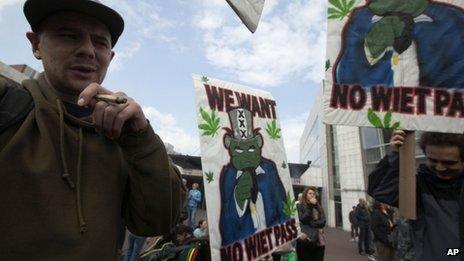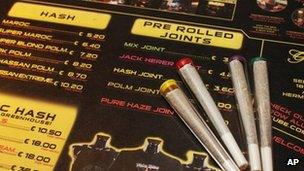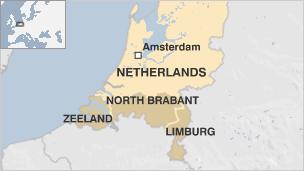Dutch cannabis cafe owners fight changes
- Published

Protesters have held street protests against the plans for new "weed passes"
A Dutch judge has ruled that tourists can legally be banned from entering cannabis cafes, as part of new restrictions which come into force this year. The BBC's Anna Holligan looks at how the proposed changes are being viewed.
The Netherlands is famous for its liberal approach to soft drugs.
Cannabis cafes or coffee shops are a common sight in most cities and a major attraction for tourists.
While it is not strictly legal to smoke cannabis here, its use is tolerated.
The Dutch government decriminalised the possession of less than five grams of cannabis in 1976. But now it wants to tighten the restrictions.
The new law is designed to cut the numbers of drug tourists who, some residents had complained, were creating nuisances like traffic jams and an increase of hard drug dealers on the streets.
The change in the law is also designed to reduce cross-border crime caused by foreigners coming to the Netherlands to buy their drugs then returning to sell them illegally at home.
From 1 May, coffee shops in the southern provinces of Zeeland, North Brabant and Limburg will become members-only clubs.
They will be allowed to issue up to 2,000 membership cards, also known as "weed passes" to residents over the age of 18.
The new rules are due to be rolled out across the country in January 2013.
'Discrimination'
There are around 700 coffee shops in the Netherlands. The group of 19 owners who took the case to court claims the cannabis-for-locals-only law is illegal because it discriminates between EU citizens on the basis of where they live.

Some cafe owners say the new rules will cost up to 90% of their business
Marc Josemans runs the 'Easy Going' coffee shop in Maastricht and has been one of the most outspoken opponents of the ban. He says the new law designed to cut crime will actually have the opposite effect.
"People come here because they know they can buy cannabis. After the ban they will still come but when they find they're not allowed inside then they will go outside and the dangerous criminal drug dealers will be waiting for them with open arms, " Mr Josemans says.
"We are pushing people into the hands of criminals, it was to stop that from happening that our tolerance policy was introduced in the first place and it was working."
Mr Josemans says his cafe, along with many others, is planning to boycott the new law - a move that will force the government to challenge them in court.
So how strong is their argument? Svetla Yosifova is a lecturer in EU law at The Hague University of Applied Science. She says the same rules do not necessarily apply when it comes to cannabis consumption.
"It's a narcotic drug. The importation and sale of narcotics is prohibited within the EU, unless it's done under strictly controlled channels for scientific or medical purposes," Ms Yosifova says.
She explains that "because of that prohibition, the free movement and the prohibition of discrimination on the grounds of nationality in the EU cannot be relied upon".
Tourism blow?
In Amsterdam, even the mayor is opposed to the new law. Eberhard van der Laan says Amsterdam does not suffer major problems from pot smokers, and that it does not make sense to apply the same policy developed for the border cities.

The city relies heavily on tourism with an estimated third of visitors drawn in by the prospect of being able to take advantage of the relaxed approach to smoking cannabis.
Now there are fears that the new law could be a big blow for the tourism industry.
It is thought the mayor and other city officials will fight the implementation of the ban before it comes into force in Amsterdam.
Last week pro-cannabis campaigners took to the streets to show their opposition.
Wider crackdown
But John, an Amsterdam resident, told the BBC that he supported the judge's ruling.
"All we have achieved in the last 50 years is to empower criminals, who continue to supply these cafes," he said.
"I would be in favour of a ban, because the endless stream of tourist traffic caused by the two coffee shops in the street adjacent to mine would stop.
"The mayor of Amsterdam should be working on other ways of making money, rather than encouraging the sale of drugs to tourists.
"A ban would probably have a negative effect on tourism, but do we really deserve the money brought in by these tourists, when some of that money is also going to criminal elements?"
This latest tightening of the law is part of a wider crackdown on drugs introduced by the recently collapsed coalition Conservative-led government.
In October strong cannabis was reclassified as a hard drug, amid concerns about its potentially psychotic effects.
The move forced cannabis coffee shops to remove the more popular, stronger varieties from their shelves.
- Published8 October 2011
- Published1 October 2011
- Published29 September 2011